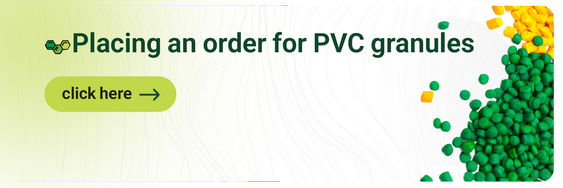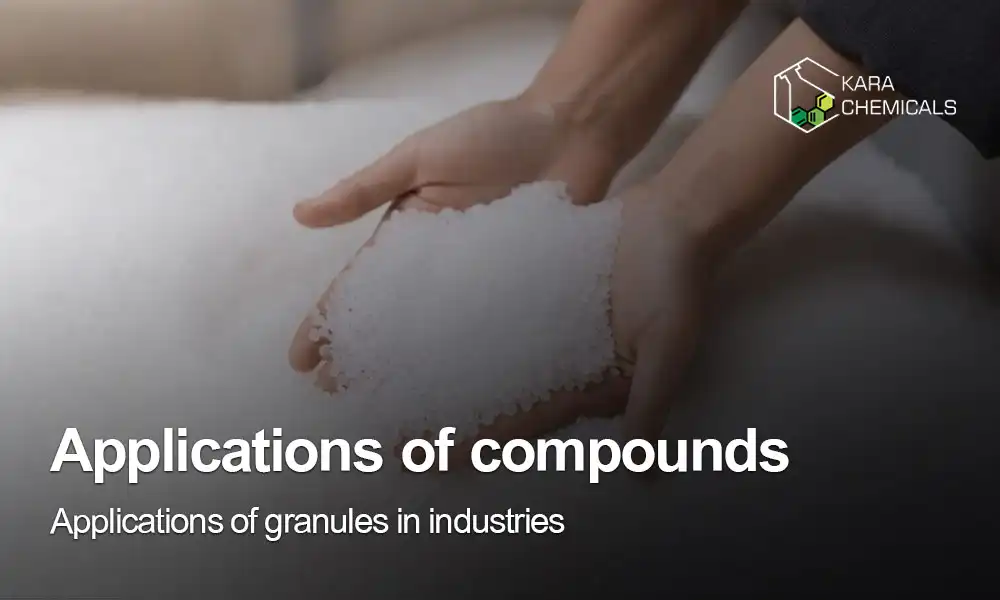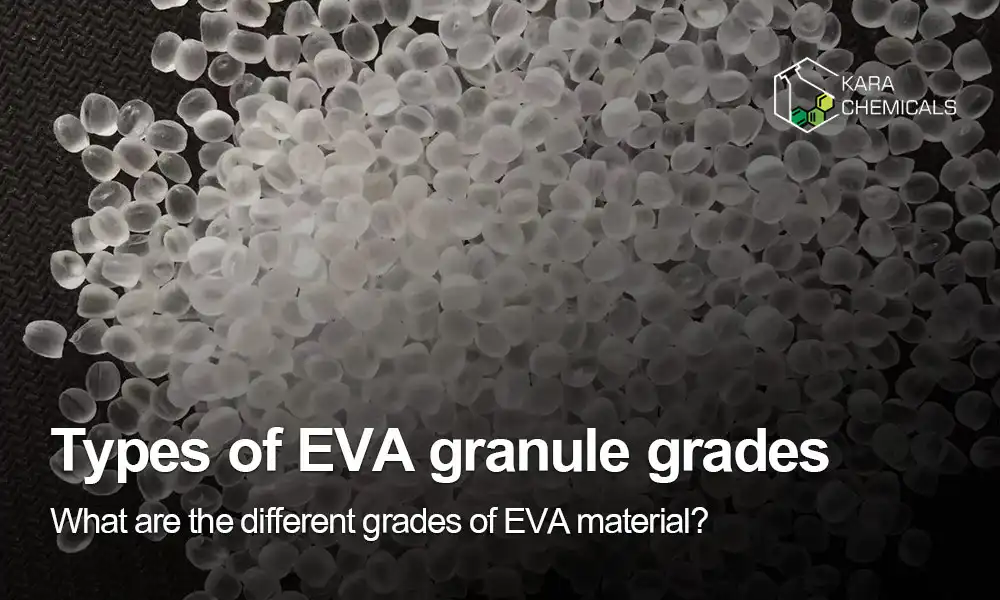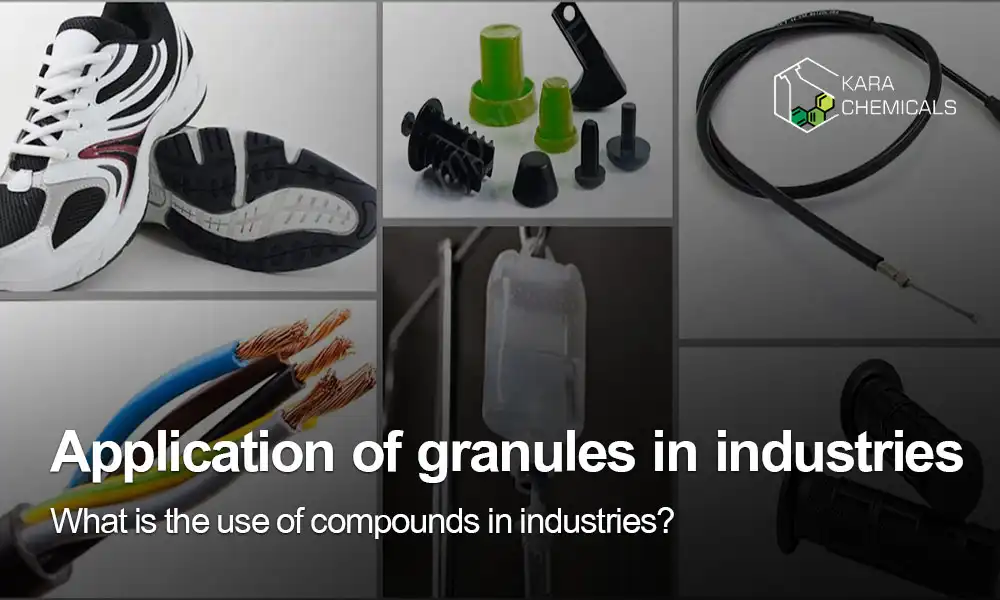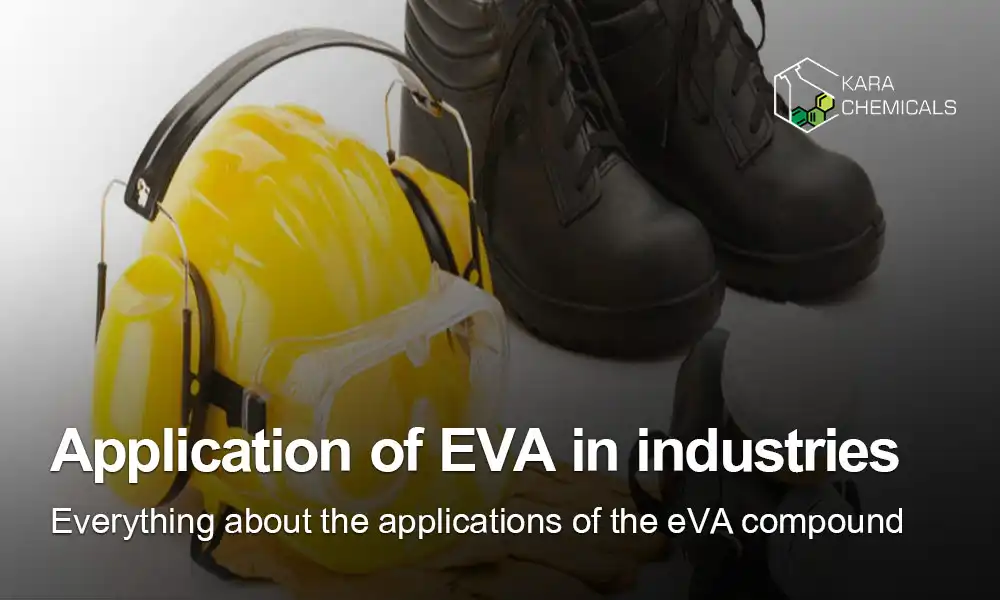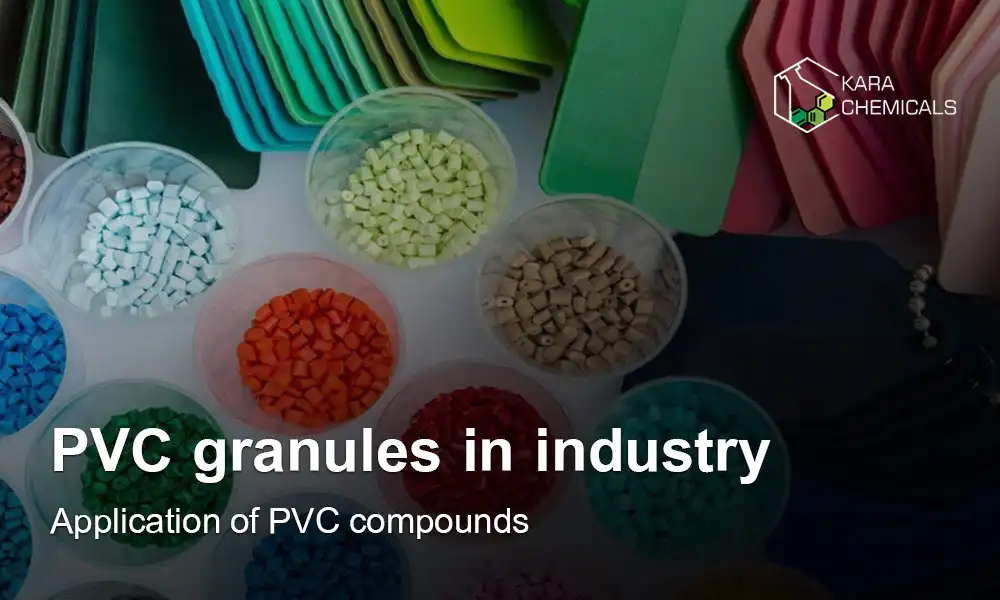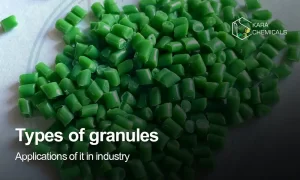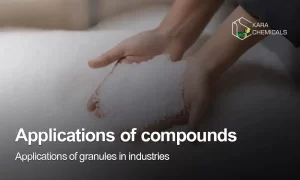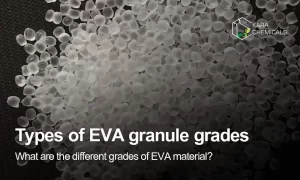Today, granules have played a very prominent role in our lives and are used in the production of many products, from shoes and slippers to medical equipment such as blood bags, breathing tubes, etc., which is very important. There are different types of granules, each of which has unique properties and is used in different fields. Among the most common types of granules, we can mention polyethylene, polypropylene, polystyrene polycarbonate, polyvinyl chloride and ethylene vinyl acetate granules, each of which has different chemical and mechanical properties and is suitable for specific applications. Polymers are used in the form of powder, flakes and granules, but the question always arises, which type of them is suitable for use in industries? Granule is by far the best type of polymer form for industrial use. Because plastic production machines are made in such a way that instead of powder, it is better to use the granule form of polymer. Therefore, in this article, we are trying to deal with the types of granules and learn about the use of types of compounds in industries. After reading this article, you will understand the importance of granules in your life. Follow us to the end to know this article.
Definition of granules
In the definition of granule, we must first understand that granule is not a special polymer material, but a form of a polymer that is produced in the form of small pellets like pellets to be used to make plastic products. In fact, raw materials were initially used in the form of powder in the production of plastic products, but later it was found that these polymer materials in the form of powder cause risks such as breathing problems, lung problems and blood problems. In addition, the use of materials in the form of powder is not economically viable because a large amount of this powder is wasted during use and also causes environmental pollution.
Therefore, the researchers realized that they should make the polymer materials into granules and then use the granules to produce a variety of plastic products. There are different types of granules, each of which has several properties and is used for different applications. The most widely used types of granules include polyethylene, polypropylene, polycarbonate, polyvinyl chloride (PVC) and ethylene vinyl acetate (EVA) granules, which are discussed below.

Types of granules categorization based on composition
Polymers are large linear chain molecules composed of consecutively repeated monomers linked together by covalent bonds. The method of connecting molecules to each other is called polymerization. According to the types of granules, polymers are divided into two general categories: organic and inorganic:
۱٫ Organic polymers
Organic polymers are mainly composed of carbon and hydrogen atoms and often together with some heteroatoms such as oxygen, nitrogen and sulfur. Organic polymers are found naturally in plants and animals and can also be synthesized artificially. Starch and cellulose, nucleic acids and proteins are natural organic substances. Some examples of organic polymers are: Polyethylene is an organic polymer made of several monomeric subunits of carbon and hydrogen. In fact, this substance is a long chain of hydrocarbons that are connected to each other and is considered one of the popular compounds that is used in the production of many products. Polypropylene granule is also considered an organic compound because it has a polymer whose monomer is propylene consisting of an organic hydrocarbon with the chemical formula C3H6. Polycarbonate, polystyrene and polyvinyl chloride polymers are also considered organic polymers.
۲٫ Inorganic polymers
These polymers are composed of inorganic molecules. Inorganic polymers are macromolecules composed of atoms other than carbon in the main or backbone chain linked by single or double covalent bonds. Inorganic polymers have some properties not found in organic materials, including flexibility at low temperatures, electrical conductivity, and non-flammability. Inorganic molecules include atoms such as silicon, boron, phosphorus and sulfur. Inorganic polymers are found naturally in nature and can also be synthesized synthetically. Some examples of inorganic polymers include polysilanes, polysiloxanes, polysilazanes, polysulfides, polyphosphazenes, and polythiazyl.

Read more: Properties of the granule
Explanation of different granulation techniques of types of granules
Granulation techniques are processes used to create granules from powdered materials. The choice of granulation method depends on various factors such as the type of material, the properties of the desired final product, and the processing conditions. There are different techniques for the production of different types of granules, where the extruder machine is used for the production of granules.
The extruder machine is one of the best granule making machines, the process conditions of the extruder and the granulating machine are different depending on the size, shape and uniformity of the granules. The most common granule production line methods include the following:
Dry granulation
In this method, the materials are poured into the extruder after being crushed and melted. Then they are passed through a sieve with fine holes and cut by a blade as they are molten. After this stage, they are simultaneously sucked in by a sucker and passed through a pipe that is cold and then dried. This method is more accurate because it costs more than other methods, but their stability is higher than other methods in terms of plastic properties.
Granulation by string
This method is one of the most used methods among the production of granules. Because this method uses simpler devices and machines, and that is why it is so popular. In Iran, this method is mostly used to produce all kinds of granules. In this method, raw materials are placed in the extruder after melting. After that, they are passed through a strainer and cut into strings in a granulator machine. In the next step, to dry these strings, they are passed through cold water and after drying, they are put into the grinder to be cut into small pieces. This method is mostly used to produce recycled granules and requires an operator because the production line is not stable and the strings are constantly cut; Therefore, it has low accuracy and requires an essential operator. The granules produced by this technique have sharp corners.
Granulation by blue ring cutting system
This method is simple and much more efficient. In this method, the material is melted and homogenized in the extruder. Then the molten material is passed through a strainer and cut into small pieces by rotating blades. After this stage, the materials stick around the tank using centrifugal force, and with the presence of cold water that circulates around this tank, it cools the materials. This method has good stability in the production line and is a suitable option for producing fragile compounds. Among the advantages of this method, we can mention the production of a quality final product, easy cleaning during the color change process, easy use and operation, and saving water.
Granulation by underwater cutting system
In this method, the plastic materials are first melted and then placed in the extruder and passed through a strainer and sent underwater, where they are cut at a high speed, and then the pellets are extracted by water circulation. They are transported centrifugally. Among the advantages of this method, we can mention the high production volume, energy saving and compatibility of the produced pellets in terms of shape and structure. This method is a suitable option for most thermoplastics. One of the disadvantages of this method is its maintenance cost, which is very high.

Physical and Chemical Properties of types of granules
As we mentioned, there are different types of granules, each of which has different chemical, physical, mechanical and thermal properties. In the following, we will examine the physical and chemical properties of the most common types of granules:
Polyethylene granule (PE)
The properties of polyethylene are completely different depending on its type. Molecular weight, cross-linking and the presence of comonomers all strongly influence its properties. Polyethylene has a density between 0.88 and 0.96 g/cm³. Considering that polyethylene exists in different densities, this density can be different depending on the specific grade and molecular weight of the polymer. The melting point of polyethylene is usually between 115 and 135 degrees Celsius. Polyethylene granules are in the form of small round white balls. Polyethylene has good chemical properties. This type of granules have good transparency and gloss.
The higher the crystallinity, the higher the density and chemical and mechanical stability. In addition, one of the most important chemical properties of polyethylene is its excellent resistance to chemicals, and most of its grades, LDPE, MDPE, and HDPE, have excellent chemical resistance to strong acids and bases. Also, this type of granules does not pass any water and compared to other plastics, the permeability of gas and water vapor is very low.
Polypropylene granules (PP)
This type of granule has a density range of 0.855 g/cm³ (amorphous) to 0.946 g/cm³ (crystalline). The melting point of polypropylene is from 130 to 171 degrees Celsius. It looks like small balls. Polypropylene granules are very similar to polyethylene granules and have almost the same chemical properties. Among its chemical properties, it can be mentioned that it is resistant to chemical solvents, bases and acids. Also, this type of granules do not absorb moisture, and in addition to this, it has a high resistance to environmental stress and also has a high temperature resistance.
Polycarbonate granules (PC)
This granule has a density of 1.20 to 1.22 g/cm3 and its melting point is 155 degrees Celsius. These granules are also used in the form of small balls. This type of granules has good impact and scratch resistance, resistance to stretching and bending, resistance to ultraviolet rays and different weather conditions. One of its other important properties is its inflammability. It is also a good heat insulator and plays a significant role in saving energy.
Polystyrene granules (PS)
This type of granule has a density of 0.96 to 1.04 g/cm³ and its melting point is 212 degrees Celsius. This granule is white in color and produced in the form of small balls. Among the types of granules, this type has low conductivity and is insulating. And because it is non-polar, it is not soluble in water, and it also has low resistance to UV rays and oxygen, but it shows good resistance to chemicals such as acids and bases.
Polyvinyl chloride (PVC) granules
Polyvinyl chloride has a density of 1.4 g/cm3 and its melting point is 185°F. It is white, brittle and solid in appearance. PVC granules have chemical properties such as high resistance to dilute acids, dilute alkalis and aliphatic hydrocarbons. It also has acceptable resistance to sunlight and atmospheric conditions.
Ethylene Vinyl Acetate (EVA)
Ethylene vinyl acetate has a density of 0.921-0.970 g/cc and its melting point is from 90 to 120 degrees Celsius and it is transparent and white in appearance. This type of granules has high chemical resistance against diluted acids and bases, alcohols, oils and greases, aromatic hydrocarbons and halogenated hydrocarbons. In addition, they have a very good resistance to ultraviolet rays and brittleness.

Applications of different types of granules
Different types of granules are used for various applications according to their physical and chemical properties. Among the applications of highly consumed granules in the industry:
Polyethylene granule (PE)
This type of granule is one of the most widely used granules in the world. And it has different types, depending on the type of each one, they have different properties and are used for a wide range of applications. In general, due to its excellent properties such as high plasticity and good transparency, light and waterproof, high impact resistance in the production of products such as disposable containers, plastic bags, pipes, plastic bottles, packaging of food products, toys and many other things. It is no longer used.
Polypropylene granule (PP)
After polyethylene, the most popular granule used in the granule industry is polypropylene, which due to its properties such as high resistance to chemicals, heat resistance, high tensile strength, etc. in the production of products such as food and dairy product packaging, Car parts, stationery, medical and laboratory equipment, fibers, etc. are used in a wide range.
Polycarbonate granules (PC)
This type of granules are also considered as high-use granules and due to their properties such as high transparency, very high resistance to impact and sunlight, and high strength in applications such as compact discs such as CD and DVD, 3D printing, bulletproof glass, safety equipment, auto parts such as car lights, airplane parts, glass roofs and other products.
Polystyrene granules (PS)
This type of granules with properties such as formability and flexibility, affordable price, electrical insulation, very high resistance to chemicals and impact, high gloss and transparency in the production of products such as disposable containers, toys, Electrical and electronic products, plastic containers, packaging, household appliances, etc. are used.
Polyvinyl chloride (PVC) granule
This type of granule is used in many industries in the production of products such as water and sewage pipes due to its numerous properties, including high impact resistance, good flexibility, biocompatibility, electrical insulation, and high durability. It is used in fittings, door and window profiles, hoses, wires and cables, internal and external car parts such as bumpers and dashboards, sports equipment, medical equipment such as masks and breathing tubes, packaging, etc.
Ethylene Vinyl Acetate (EVA) Granule
EVA granules also have many properties such as excellent flexibility, sterility, high resistance to chemicals and sunlight, adhesive properties, etc., making it the most suitable option in shoe and glue industries. EVA compounds are mostly used in two grades of 18 and 28%. Types of EVA compounds are widely used in a wide range of industries. Among its applications, the following can be mentioned:
production of slippers, soles and soles of shoes, clothing, production of sports foams, production of adhesives such as thermal and hot-melt adhesives, production of industrial flooring, production of medical equipment such as blood bags, masks and Surgical gloves, production of various car parts, production of packaging for food and pharmaceutical products, etc.

Read more: Types of EVA granule grades
Potential advances in types of granules production and applications
Due to the properties of the types of granules and compounds, they are widely used in various industries. As we mentioned earlier, granules are produced from two types of new raw materials and recycled materials. But the important and significant issue of granules is related to the environment. Although some of these compounds are recyclable, they are not completely harmless to humans and the environment.
Many researchers and experts are trying to develop environmentally friendly polymer production processes by using environmentally friendly additives and alternative production methods. Therefore, with the potential progress in this field, in addition to recycling more products and reusing them, they have minimized plastic waste and also use compounds that, in addition to being compatible with the environment, do not harm human health.
Also, with the advancement of technology, standard and advanced devices such as extruders are used in the production of granules. In addition to saving natural resources, cost and time, these advanced devices also lead to the final quality of the products. Progress in this field continues day by day. Researchers are trying to develop new mechanical properties for different types of granules so that they can be used continuously in a wide range of applications. The future of all kinds of compounds and all kinds of granules is bright, and a lot of progress has been made in this field so far and is also being made.

The importance of understanding the Types of granules in different industries
We mentioned earlier that compounds can be produced in different types, each of which in turn has different and unique physical and chemical properties that are used in different fields to produce all kinds of plastic goods and products. The type of compound used in industries is very important. Because it is highly effective in the quality of the final product. Polymer base, compatibility factor and chemical additives are among the important things in compounds, which have different amounts in the production of compounds. Basically, compounds are added to polymer raw materials with the aim of increasing mechanical, physical and thermal properties.
As a result, each of them is suitable for a specific application. For example, a compound whose physical and chemical properties are produced in such a way that it is suitable for the production of shoes cannot be used with the same properties for the production of toys, its physical properties must be changed. Therefore, to choose a compound for the production of your desired product, be sure to consult with experts before buying. With decades of experience in this field, Karachemicals Company is proud to accompany you to buy all kinds of compounds. For consultation with the experts of this collection, you can communicate with them through the Karachemicals website and ensure the selection of the right compound for the production of the desired product.
These days, granules are used in a wide range of industries. Granules are small and round particles of different types. Polyethylene, polypropylene, polycarbonate, polystyrene, PVC and EVA granules are among the most widely used types of granules in industries, which are used in countless products. Each of these granules have their own properties and are used for applications according to their chemical and physical properties.
Therefore, it is very important to choose the right compound for the production of the desired product. In this field, Karachemicals Company can guide you to prepare the granule suitable for the production of your desired product. Karchemicals, with its expert and technical forces for many years in the field of compound and granule production, is one of the leading producers in the production of PVC compounds and EVA compounds. To buy and know the price of PVC granules and EVA granules, you can place an order through the website of this collection.
Because using recycled granules as a suitable substitute for raw materials can help protect the environment. In addition, it is economically and industrially very cost-effective, which saves and reduces costs.
Most plastic materials including polyethylene (PE), polypropylene (PP), polystyrene (PS), polyvinyl chloride (PVC) can be recycled.


